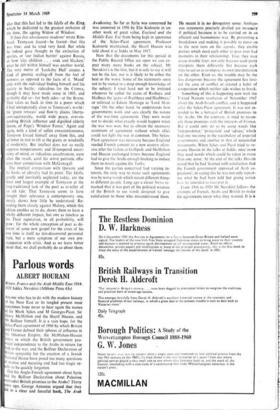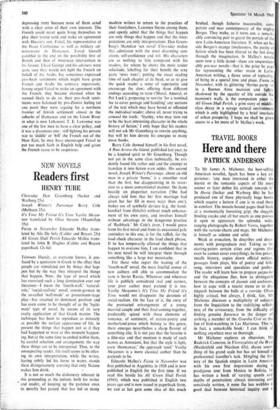Britain, France and the Arab Middle East 1914- 1920 Jukka
Nevakivi (Athlone Press 63s)
Parlous words
ALBERT HOURANI
Anyone who has to do with the modern history of the Near East or its tangled present must sometimes hope never to hear again the names of Sir Mark Sykes and M Georges-Picot, Sir Henry McMahon and the Sharif Husain, and Mr Balfour himself. It is a vain hope, for the ykes-Picot agreement of 1916 by which Britain d France defined their spheres of influence in the Ottoman Empire, the McMahon-Husain tters in which the British government pro- ised independence to the Arabs in return for eta in the war, and the Balfour Declaration of rnish sympathy for the creation of a Jewish ational Home have posed too many questions f motive and meaning and had too tragic re- Its to be quickly forgotten.
Did the Anglo-French agreement about Syria nd the Balfour Declaration about Palestine ontradict British promises to the Arabs? Thirty ears ago, George Antonius argued that they in a clear and forceful book, The Arab Awakening. So far as Syria was concerned he was answered in 1956 by Elie Kedourie in an- other work of great value, England and the Middle East. Far from being kept in ignorance of the Sykes-Picot agreement, Professor Kedourie maintained, the Sharif Husain was told about it at Jedda in May 1917.
Now that the documents for this period in the Public Record Office are open we can ex- pect many more books on the subject. Mr Nevakivi's is the first, but it is safe to say it will not be the last, nor is it likely to be either the best or the worst. Some of his statements seem not to be rooted in a deep enough knowledge of the subject; 1 tried hard not to be irritated whenever he called the cazas of Rasheya and Hastieya the `gazas of Rashbeya and Hashbeya,' or referred to Edwin Montagu as 'Lord Mon- tagu.' On the other hand, he understands how governments work and sees clearly the nature of the war-time agreements. They were made not to decide what exactly would happen when the war was won, but to obtain the necessary minimum of agreement without which allies could not fight the wat in common. The Sykes- Picot agreement was necessary because England needed French consent to a new eastern ofien- sive after the failure at Gallipoli, and McMahon and Husain exchanged letters because England had to give the Arabs enough backing to induce them to revolt against the Turks.
Since the parties concerned had varying in- terests, the only way to make such agreements was by using words which meant different things to different people. Long ago a clever Swiss re- marked that it was part of the political wisdom of the British to use words designed to give satisfaction to those who misunderstood them.
He meant it in no derogatory sense. Ambigu- ous statements precisely drafted are necessary if political business is to be carried on in an efficient and harmonious way. By preventing a breakdown and making it possible to move on to the next item on the agenda, they enable parties which need each other to pass over bad moments in their relationship. True, they may cause trouble later, not only because each party interprets them differently but because each tries to act so as to impose its own interpretation on the other. Even so. the trouble may be the less dangerous because the agreement has limi- ted the area of conflict or created a habit of cooperation which neither side wishes to break.
Something of this is happening now with the United Nations resolution of November 1967 about the Arab-Israeli conflict, and it happened after the Sykes-Picot agreement. It was not in- tended to be a betrayal of British promises to .
the Arabs. On the contrary, it tried to recon- cile those promises with the interests of France.
But it could only do so by using words like 'independence,' protection' and 'advice,' which had one meaning in the vocabulary of imperial governments and another in that of nationalist movements. When Sykes and Picot tried to re- assure Husain in the talks at ledda, once more they used words which could be taken in more than one sense. At the end of the talks Husain
statedthat he had 'learned with satisfaction that the French government approved of Arab as- pirations'; in saying this he was not only repeat- ing what he had been told but giving notice how he intended to interpret it.
From 1916 to 1920 Mr Nevakivi follows the attempts of French, Arabs and British to make the agreements mean what they wanted. It is a depressing story because none of them acted with a clear sense of their own interests. The French could never quite bring themselves to play their trump card and make an agreement with Husain's son, Faisal, his representative at the Peace Conference as well as military ad- ministrator in Damascus. Faisal himself gambled to the end on the possibility first of British and then of American intervention in his favour. Lloyd George and his advisers were quite sure they would not fight the French on behalf of the Arabs, but sometimes expressed pro-Arab sentiments which might have given French and Arabs the contrary impression; having urged Faisal to make an agreement with the French, they became alarmed when he seemed likely to do so; their pro-Arab senti- ments were balanced by pro-Zionist feeling (at one point they were arguing for a northern frontier of Jewish settlement almost in the suburbs of Damascus and on the Litani River in what is now Lebanon). T. E. Lawrence was one of the few men to have a clear policy, and it was a disastrous one: still fighting his private war to 'diddle' or 'biff' the French out of the Near East, he may have encouraged Faisal to put too much faith in English help and given the French cause to be suspicious.



































 Previous page
Previous page